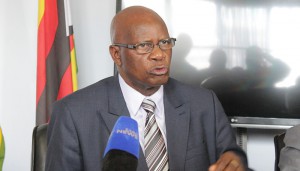Source: EDITORIAL COMMENT: For New Economic Order, eschew old bad habits | The Financial Gazette December 14, 2017

Finance Minister Patrick Chinamasa.
FINANCE Minister Patrick Chinamasa’s 2018 budget statement spared the goat. We do not refer, here, to goat meat which, from January 1, 2018, will be exempted from 15 percent value added tax. But to that hackneyed scapegoat — “illegal sanctions imposed by the West”.
Under former President Robert Mugabe’s government, rarely did a major economic policy statement omit blaming “sanctions” for Zimbabwe’s post-2000 meltdown.
Some of the Finance Minister’s figures and projections might raise questions; like the forecast increase in tax revenues at four times targeted rate of gross domestic product growth, while maintaining a modest three percent inflation rate.
But there is no denying that the policy side of his statement does suggest serious intentions to break with the past and bravely embrace a future in which some tough decisions and compromises will have to be made.
The effective repeal of the indigenisation law, except for diamond and platinum mining as well as the reserved service and retail sectors, are the highlights of the 2018 budget.
However, Chinamasa’s commitment to reducing wasteful spending, demonstrated by his decisive parrying away of $220 million in funding requests for furniture and vehicles for ministers, chiefs, MPs and senior government officials also deserves applause. As does all the other cost-cutting plans in the budget.
We will, however, caution that a “New Economic Order” will require much more than talk. It will require walking the talk and eschewing the bad habits of old.
A good place to start is keeping budget targets, an area in which government has consistently fallen short. Take, for instance, this year’s budget deficit, which at $1,7 billion is more than four times the projected $400 million. This automatically casts doubts over Chinamasa’s funding gap forecast of $672 million in 2018.
The explosion in “command agriculture” funding, from the initial $192 million to $461,1 million is particularly startling. Accounting for retention and statutory funds, such as police fee and fine collections as well as road tolls in the budget is also praiseworthy. These funds, whose management has been marred by lack of transparency, accountability and abuse, collect nearly $1 billion annually. The auditor general has routinely raised alarm over the shocking levels of abuse, with no letting up in the fraud and corruption.
This is why Chinamasa’s promise of greater transparency and accountability over the management of the funds is more than welcome. Government, however, needs to do more and provide relief to burdened tax payers by reducing fees charged by some of its agencies. The vehicle number plate fund, for instance, will raise $14 million this year and is projected to generate $15 million income next year.
This is more than double the production cost of the plates. Zimbabwean motorists pay more than four times their regional peers for the vehicle plates.
Similarly, the Zimbabwe Republic Police collected $38 million in fines, between January and September, mostly for traffic-related offences. Expectations were that this figure would reach $51 million by the end of this year. Such aggressive revenue-generation explains the menace that our police have become on the road, with clear implications on key sectors of the economy, such as tourism, transport and distribution.
Another sore point is the perpetual National Oil Company of Zimbabwe (NOCZIM) debt redemption fund, created to amortise the defunct parastatal’s fuel import debt. The fund, whose income comes from fuel import levies built into petrol and diesel prices, had generated $26,4 million between January and September, on course to a $35 million target for the full year. At current rates, the NOCZIM fund has generated about $300 million to pay off debt which stood at $158 million in 2010. This suggests abuse of the fund, which is an unwarranted tax on an already burdened taxpayer.
COMMENTS